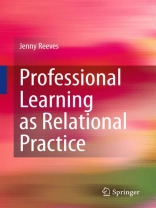Given the emphasis on transforming professional work through the adoption of enquiry-based and trans-disciplinary approaches to service development, there is an urgent need for those involved in professional education to develop a robust understanding of how changes in practice occur. A more inclusive approach to the analysis of the processes involved across the varied and interrelated contexts in which they occur is thus very timely.
In this book, Jenny Reeves sets out to explore the gap between the experience of professional learning as an interactive, dynamic and socially contextualised process, and descriptions that are often individualistic, overly linear and largely context-free. She makes the claim that this disjuncture is the outcome of modes of enquiry that concentrate on limited selections of the available data.
Adopting a relational approach to describing practice-based professional development, including graphical means for exploring the spaces produced by the activity, provides a very different picture. It creates a basis for representing the complex movements, relationships and interactions between people and things that occur during professional learning. It also provides a productive approach to describing the exchange and creation of professional knowledge across different contexts over time.
By building a picture of the ephemeral spaces and connections that educating activities produce, mapping relational space allows those engaged in professional education to think rather differently about how professional learning and changes in knowledge and practice may be understood, supported and developed.
สารบัญ
Mapping the Relational Spaces of Educating.- Adopting a New Approach to Professional Learning.- Describing Educating Systems.- The Field of Educating: Tracking Relations and Relays.- Making Learning Spaces Visible.- Professional Learning as Relational Practice.- Changing Self: Interactions of Space and Identity.- Pedagogy: Creating a Hub in a Field of Relays.- Constructing Knowledge and Agency.- Tracking Knowledge Creation and Exchange.- Knowledge Creation: The Reflexivity of Hybrid Systems.- Conclusion.












